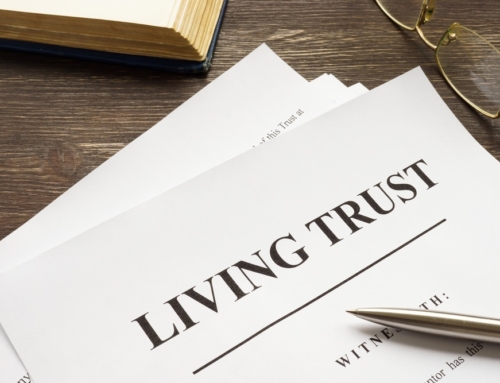Inheriting property in a trust is far easier than going through probate.
Q: My dad owns a duplex. He lives upstairs and rents the downstairs unit. He wants me to inherit the property after he dies. Should we transfer ownership of the property by will or by adding me to the deed?
I understand all about how the stepped-up basis works on a primary home when someone inherits it. But this is different – at least I think so. Then there is the $250,000 tax deduction you get on selling a primary residence. Would that apply to me if I were on the deed and he passed away?
Inheriting property in a trust that’s half residential, half investment
A: You’ve asked some good questions, but haven’t given us quite enough information for a complete answer. So we’ll make a few assumptions about what you and your dad have in mind.
Let’s start with the $250,000 tax exclusion. It’s not a deduction. Instead, you get to exclude the first $250,000 in profit you make from any federal capital gains taxes that would be owed when you sell your primary residence. The one major rule on taking that exclusion is that you must have lived in that home as your primary residence for two out of the last five years. (Married couples get to exclude $500,000 from capital gains taxes on the sale of their primary residence.)
The $250,000 exclusion only apply if you live in the home as your permanent home
There are a few other rules that govern the tax exclusion, and you’ll find them here: IRS Publication 523: Selling Your Home.
Right now, your dad lives in one-half of the property. You don’t appear to live there at all. If your dad lives in one-half of the property, when he sells the building, he’ll only be able to exclude the profits earned on that portion of the property under the rules for the $250,000 tax exclusion.
But there are other ways for your dad to sell this property and maximize profits.
Set up a trust for the property
We have often warned parents not to add their children to the title of their home. Instead, it typically works better for a child to inherit the home upon the death of a parent because of the stepped-up basis. Why? If you inherit the home, it will be valued at the market price at the time of the parent’s death. If, for example, the parent purchased the home for $10,000 years ago, and at the time of death the property is worth one million dollars, the child inherits the home at that value. When it is sold shortly after the parent’s death, the child would owe no federal income taxes.
It’s better to inherit property through a trust than receive it as a gift
It’s tempting to simply add a child to a property’s title. That does make it easier for the home to pass from the parent to the child. But you can also set up a simple living trust and deed the property into that trust. Upon the death of the parent, the trust can designate the child as the successor trustee and successor owner of the trust.
With this solution, you avoid probate court and the costs of probate by using a trust. On the other hand, you might have to pay an attorney to assist you in setting up the living trust and to transfer ownership of the home into the living trust. Another option is to have your father sign a will that gives you the home upon his death. But if you only use a will, you might need to probate the will and then transfer the home after his death through probate, which is time consuming and might be expensive. But, you’ll likely avoid any capital gains tax issues if you sell the property within a year after your father’s death.
Compare benefits with ways to inherit property
The fact that the property is part personal residence and part investment is an interesting wrinkle that most heirs won’t face. Your father owns a duplex and rents one unit out. In this situation, you have to look at their home as two separate properties. One property would be the part of the home he uses as their primary residence and the other is the rental property.
Let’s say the property is split equally between income-producing real estate and the primary residence. If your dad sold the home today, he’d be able to exclude up to $250,000 from the sale of that portion of the building that he used as his primary residence. However, he’d likely have to pay tax on any profit he makes on the sale of the rental unit. He also will have to pay taxes on the recaptured depreciation.
Stepped-up value is one way to benefit from inheriting property
When he dies, you’d inherit both the personal residence and investment income side of the property at the stepped up value. So, if the property was worth one million dollars at the time of his death and you sell it for that amount within a year, you’d pay no taxes on that sale. For IRS purposes, it’s as if you inherited the property for one million dollars and sold it for one million dollars, so there’s no profit. The stepped up basis would cover any taxes owed.
As you can see, you’re better off inheriting the property than being put on title before your dad dies.
Gifting property could bring downstream tax issues
Now, if you must put your name on title with your dad prior to his death, that may cause some downstream tax issues. Talk to an accountant or go through the numbers with someone that has knowledge of federal income taxes before you do anything. When you are placed on title, you’ll need to know the value of the home as of that date.
Let’s assume you become a half owner in the building while your dad is alive. Now, you own half of his primary residence and half of the income producing property. If the property is worth $750,000 at the time you are given your half interest, you’d allocate half of that value towards the home and half towards the income-producing portion of the building. Technically, the residential and investment portion are each worth $375,000.
When your dad dies, you’ll automatically become the owner of the entire building if you own the property as joint owners with rights of survivorship. If you own the property as tenants in common, you might not automatically own the entire property upon his death. (As we’ve discussed previously, how you title property is extremely important.)
If you own half outright, your tax bill could be high
In this scenario, if you sell the home shortly after his death when the property is worth one million dollars, you’d pay taxes on $125,000, which is your share of the appreciation of the property. You may also have other taxes to pay on the income-producing portion of the property. You could also choose to live there and keep renting out the income-producing portion of the building. Or, you might decide to keep the property and rent out both units. Either option may give you income as well as some valuable tax benefits.
Inheriting property with a TOD
Finally, there are other types of trusts and legal instruments that may be an option, including one that will transfer ownership to you slowly over a period of years. Your father could also choose a transfer-on-death (TOD) deed.
There are pros and cons to each choice, but the bottom line is we prefer you avoid getting ownership of the home while your dad is living. For a clearer picture of what the variety of options would mean for you, your personal finances and any tax bill you’d owe, talk with an estate attorney. Perhaps even your father’s estate attorney. You’ll want to cover the specifics of your dad’s ownership, including the value of the home when he purchased it, what improvements he’s made over the years, and what it’s worth now.
For additional information on how the IRS views residential rental property, check out IRS Publication 527: Residential Rental Property.







Leave A Comment